In the highly competitive landscape of the legal industry, attracting new clients is a crucial challenge—especially for business law firms that cater to a diverse array of clients, from local startups to international corporations.
If you’re reading this blog, you probably already know about the importance of personal networking and relationships; you’re interested in smart business law marketing tactics. In a digital-first world, the key to driving new business lies in the practical implementation of a holistic search-marketing strategy that proficiently integrates SEO, PPC ads on search engines, and local service ads.
So let’s discuss how to do that! Welcome to the definitive guide on business law marketing, where we delve into actionable strategies and provide clear insights that resonate with the specific challenges faced by business lawyer marketing practitioners. It all starts with search engine optimization (SEO).
Harnessing the Power of SEO in Business Law Marketing
SEO remains at the core of all successful, online business law marketing initiatives. When used correctly, it can enhance your online visibility drastically and position your law firm at the forefront of organic search engine results.
Look at SEO as the foundation of your search marketing strategy. The objective here is to have your website rank prominently when potential clients search for “business law attorneys” or “business attorney.”
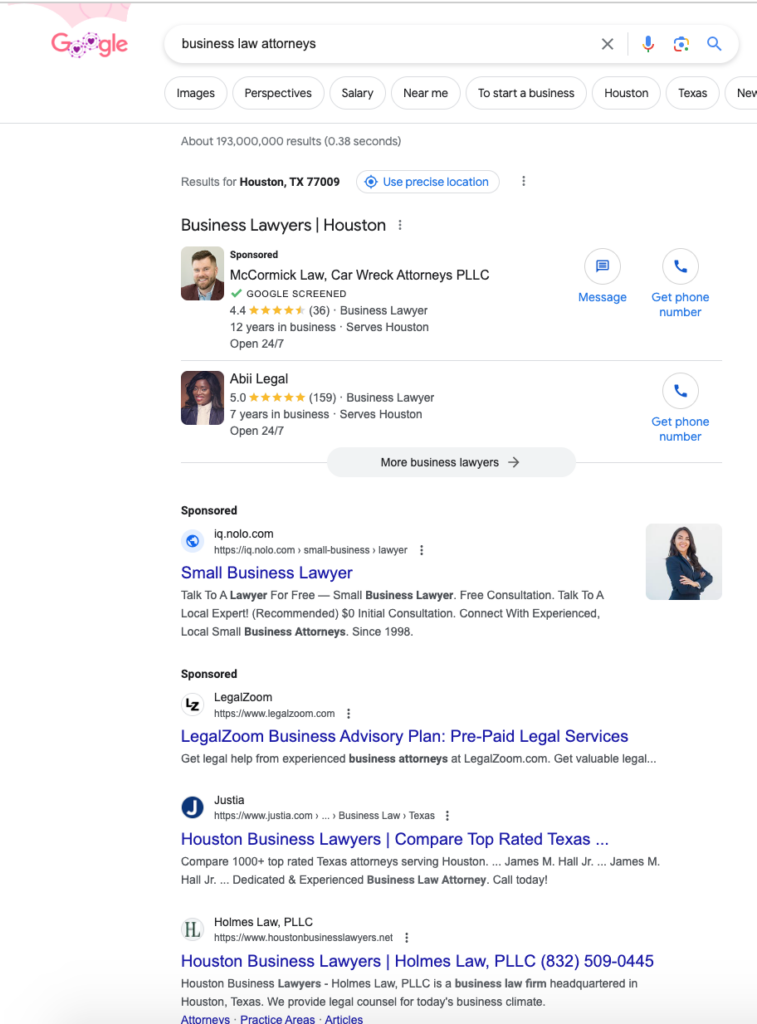
This is achieved by developing SEO-optimized content that targets these specific keywords, guided by carefully researched user intent. You can do your own keyword research using tools like the Keywords Explorer from Ahrefs.
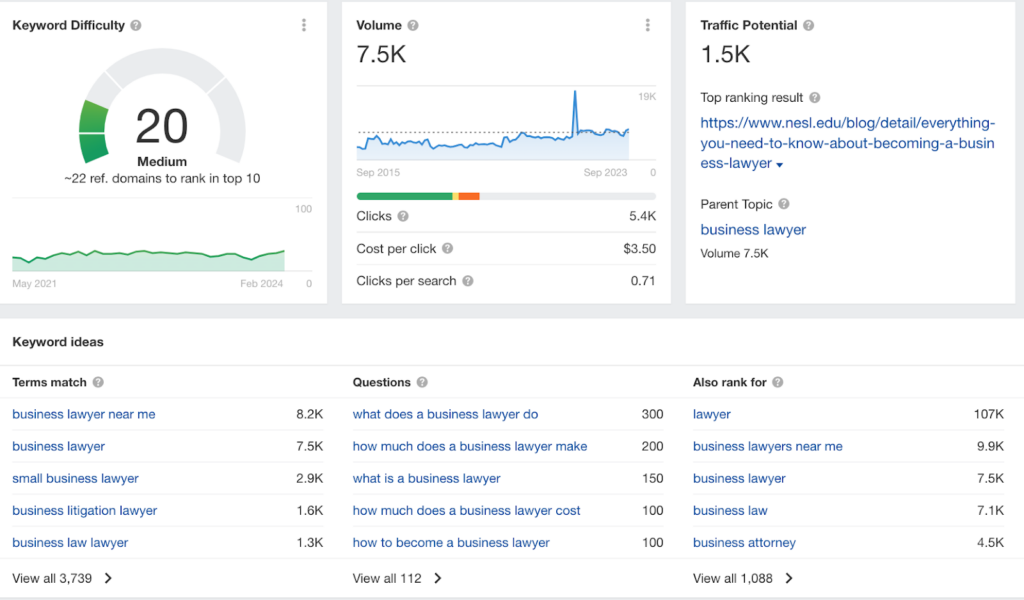
Remember, local SEO is another significant piece of the puzzle. A business law firm benefits primarily from local clients. Hence, optimizing your online presence to reflect your local footprint—especially on your Google Business Profile—ensures visibility to clients in your specific geographic area.
The Critical Role of PPC Ads in Business Attorney Marketing
When you need immediate visibility, turn to pay-per-click (PPC) advertising. It is an essential component of marketing for business law attorneys, providing you with the opportunity to feature prominently at the top of search results. By targeting specific keywords related to your practice areas, such as “business lawyers in Atlanta” or “set up an LLC,” you guarantee that your firm is directly visible to those looking for your services.
Leverage Local Service Ads
Local Service ads serve as your silent canvasser on search engines. They play a pivotal role in maximizing local lead generation by appearing at the very top of the search results, even above PPC ads. When a potential client searches for legal assistance in your region, your ad makes it quick and simple for them to connect with you.

Creating an Effective Search Marketing Strategy for Business Law Firms: A Tactical Approach
To achieve success in business law marketing, it’s essential to develop a search marketing strategy that aligns with the needs of prospective clients and delivers meaningful results. Specific tactics for building a powerful search marketing campaign must include finding relevant keywords, creating high-ranking content, driving traffic through paid and organic search, and converting that traffic into clients.
Step 1: Finding Relevant Keywords for Business Law Firms
Your search marketing strategy begins with identifying the right keywords that will draw potential clients to your online presence. To accomplish this, follow these steps:
- Begin with industry-specific terms. Focus on fundamental business-law-related keywords such as “business law attorney,” “corporate lawyer,” and “commercial litigation.”
- Expand to long-tail keywords. Look for more descriptive phrases that potential clients might use when searching for legal representation, like “business contract dispute attorney” or “intellectual property law firm.”
- Consider local keywords. Incorporate geographical terms to capture clients searching for legal help within your local area. For instance, “Los Angeles business law attorney” or “Chicago corporate lawyer.”
- Use keyword research tools. Employ tools like Google Ads Keyword Planner or Ahrefs to find additional keyword ideas and assess competition and search volume.
These keywords will form the SEO backbone of all the digital marketing you will create.
Step 2: Transforming Keywords into High-Ranking Web Content and Landing Pages
Once you’ve identified the right keywords, it’s time to create the content and landing pages that will attract and engage your target audience.
- Develop informative and valuable content. Write blog posts, articles, or whitepapers that address common business law issues and demonstrate your expertise in solving them. Incorporate strategic keywords naturally throughout. Here are a couple examples of the kind of articles you can add to your site from Hunnicutt Law Group that use some common business-law-related keywords.
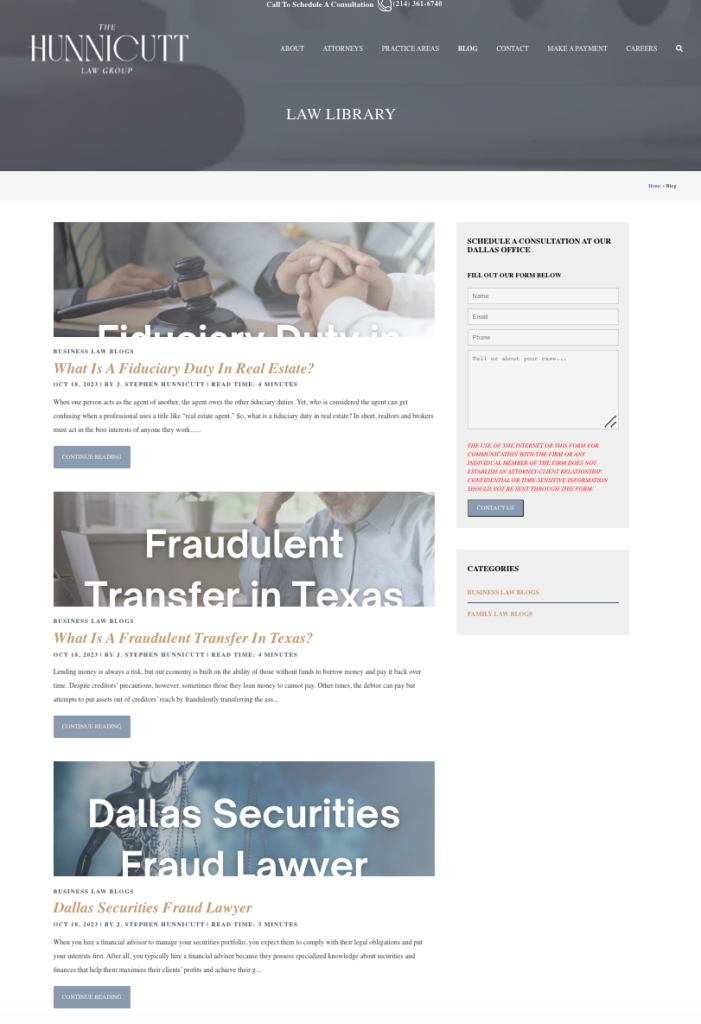
- Craft compelling landing pages. Create dedicated landing pages for each of your key practice areas. Make sure to include your target keywords prominently in the meta title, meta description, headings, and content.
- Optimize for user experience. Ensure your website is easily navigable and responsive across all devices. Fast loading times and clear calls to action will contribute to a positive user experience, making it more likely that search engines will find your content valuable.
- Acquire authoritative backlinks. Reach out to reputable sites in the legal and business sectors, offering relevant, high-quality content that they can link to. Backlinks will help boost your site’s credibility and improve search rankings.
For great examples of effective landing pages based on relevant keywords, visit MyLawTeam.com. You can clearly view the tactics we’re talking about here at work in content such as “How to Start an LLC in Texas.”

Step 3: Driving Traffic to Your Landing Pages with Paid and Organic Search
Attracting targeted traffic is a crucial component of your search marketing strategy. Combine both paid search and organic search efforts to maximize your reach.
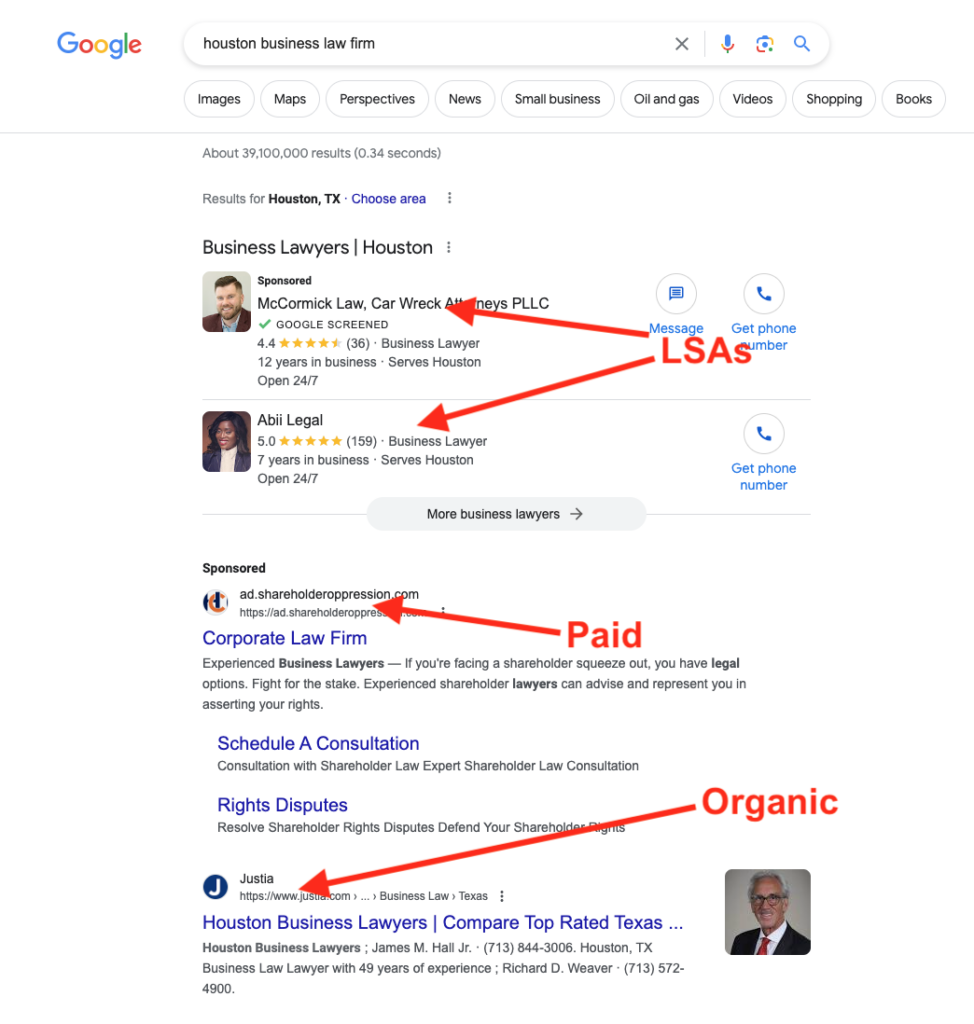
There are three pillars to effective search engine marketing:
- Leverage PPC advertising. Use paid search platforms like Google Ads to create targeted ad campaigns that will feature your landing pages in prominent search results when users input your chosen keywords.
- Pursue organic search growth. Consistently produce informative, SEO-optimized content to increase your organic search ranking over time.
- Monitor and track progress. Use analytics tools to measure the performance of your paid and organic search initiatives, adapting your approach based on the data you collect.
Let’s take a look at a screenshot of the relevant keywords for Hunnicutt Law Group on Ahrefs. This is a useful example of how to track which keywords and content are performing best for your business law firm.
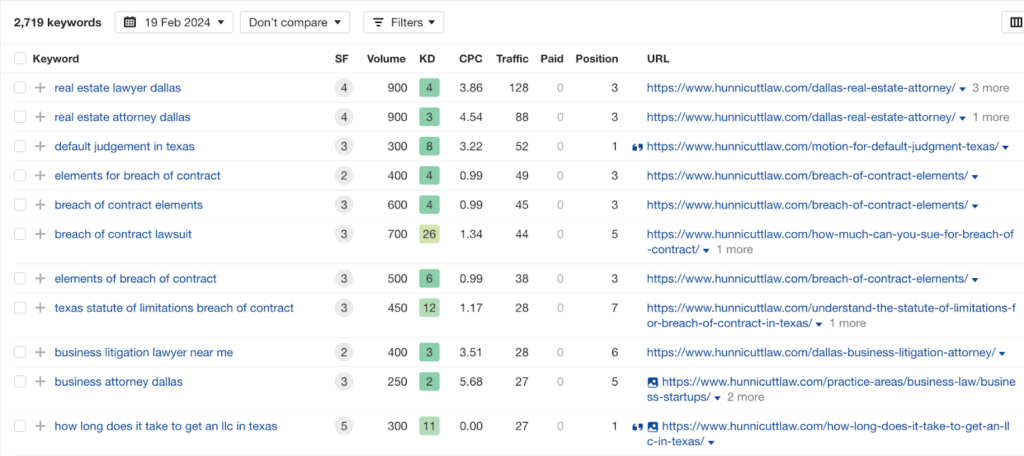
Step 4: Converting Search Traffic Into Clients
Attracting visitors to your site is the foundation for acquiring new clients. However, it’s equally vital to convert those visitors into clients by:
- Demonstrating credibility. Showcase your expertise, experience, and accomplishments throughout your landing pages. Client testimonials and case studies can also help establish trust.
- Providing clear calls to action (CTAs). Guide potential clients toward the next steps with distinct and attention-grabbing CTAs that encourage contacting your firm, scheduling a consultation, or downloading informative resources.
- Offering immediate assistance. Integrate live chat, chatbots, or a responsive contact form to provide prompt assistance and information to prospective clients.
- Implementing lead nurturing. Engage with leads who express interest by providing valuable resources through email, inviting them to webinars, or offering follow-up consultations. This will keep your firm top-of-mind and increase the likelihood of conversion.
To see these tactics in action, take a look at this landing page on BBGA’s website:
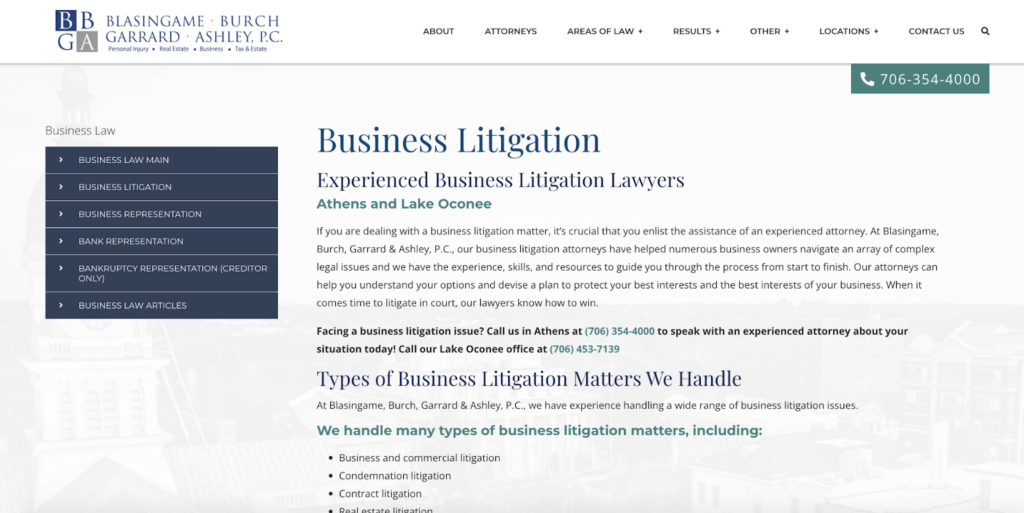
Notice the credible information provided and the clear-cut CTAs? By diligently following these tactical steps, your business law firm will be well-equipped to implement a comprehensive and effective search marketing strategy.
Get Specific About the Business Law Client You Want
In the competitive digital arena where clarity equates to strength, business law firms must articulate unambiguously the categories of cases they specialize in, whether transactional or litigation. The importance of this differentiation cannot be overstated, as it goes to the core of serving client needs and optimizing search engine visibility.
Let’s explore why specificity in your legal offerings is not just important but essential to your firm’s online success.
Narrowing the Client’s Search for Legal Expertise
Prospective clients are seeking not just a lawyer but an advocate who is expertly attuned to the particular legal challenge they face. When a business law firm specifies its area of specialization, it immediately refines the client’s search process, connecting your firm with the exact clientele you are best equipped to serve. The delineation between transactional work—such as mergers and acquisitions, corporate governance, or contract drafting—and litigation, which encompasses dispute resolution in court, is particularly crucial. By clearly defining your niche, the potential client can easily determine if your firm’s expertise aligns with their immediate legal requirement.
Enhancing SEO Through Targeted Keywords
From an SEO standpoint, specificity drives traffic. Identifying your practice as a specialist in “business transactional law” or “commercial litigation” will affect the keywords you target, the content you generate, and, ultimately, how effectively you reach your intended audience. Precise keywords lead to improved search rankings, as search engines deliver results that closely match the intent of the searcher. By catering your SEO efforts distinctly toward transactional cases or litigation, you significantly increase the likelihood of appearing in searches performed by individuals and businesses needing those exact services.
Establishing Authority and Trust
Detailed online content reflecting your firm’s specializations empowers your brand as an authoritative voice in that legal niche. A business seeking a firm skilled in navigating complex commercial litigation wants assurance that their potential legal counsel harbors the requisite depth of experience. Conversely, a company needing sound legal guidance for transactional matters requires an equivalent level of trust in their attorney’s proficiency in that arena. The distinct listing of your firm’s areas of expertise fosters a sense of credibility and mastery, which is pivotal to building trust with potential clients before they even step foot in your office.
Facilitating Better Conversion Rates
Effective marketing is not only about attracting visitors—it’s about converting them into clients. When visitors to your site find clear information that resonates with their specific needs, conversion rates naturally increase. Clients often arrive at your site ready to engage, looking for the assurance that your firm can handle cases like theirs. A distinct focus on transactional cases or litigation in your online materials aids in swiftly guiding potential clients through the decision-making process to the call to action.
Get Started Generating Business Law Leads for Lawyers
In our burgeoning digital age, the essence of how to get clients for your law firm rests in the adept execution of an all-encompassing search marketing plan. This strategy seamlessly merges SEO, PPC advertising, and local service ads—all vital tools that, when effectively implemented, can strengthen your law firm’s online presence and help secure profitable client relationships. Let this blog post be your guide toward capturing the relevant audience your business law firm needs to thrive.
If you need help creating and implementing a successful marketing strategy for your business law firm, you’re in luck! Contact the expert team at Juris Digital today for a free consultation on your marketing needs. Our seasoned team of law firm marketing experts is standing by to build an online marketing machine that will work just as hard as you do.
